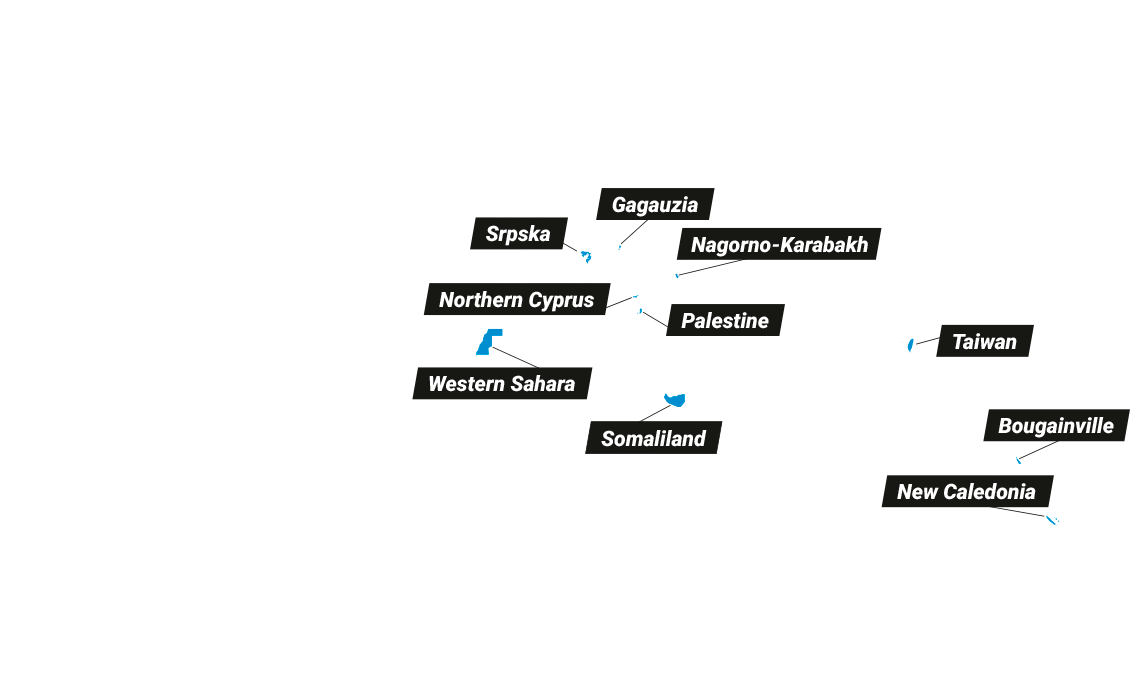
The State Succession Index 2024 highlights 10 key states or territories where state succession or events leading to state succession have occurred. The Index offers insights into processes that have resulted, or may result, in complex legal, political, financial, commercial, and diplomatic consequences, with both regional and global implications. These developments are shaping international arrangements and influencing global governance.
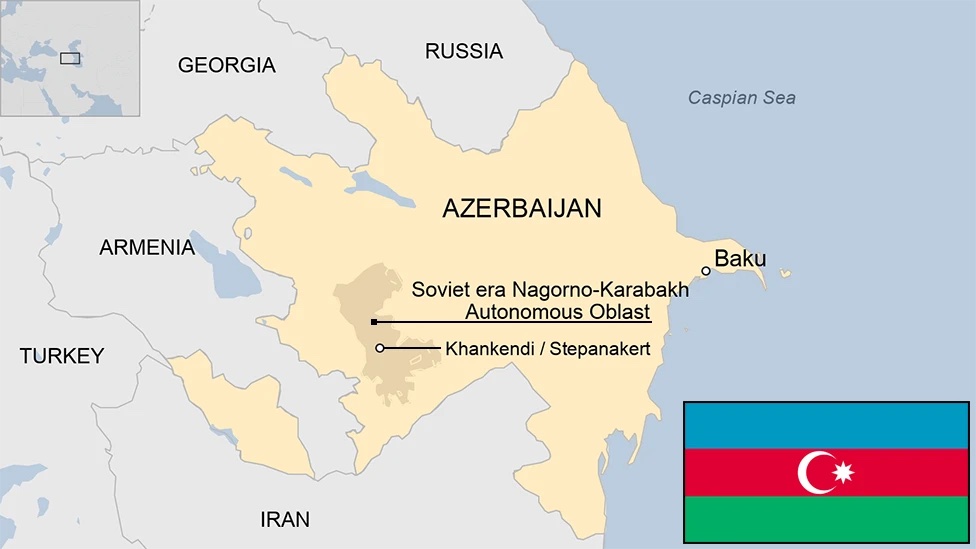
Nagorno-Karabakh

The dissolution of the Republic of Artsakh on January 1, 2024, marked a decisive moment in the Nagorno-Karabakh conflict. This dramatic shift has reinforced Azerbaijan’s territorial integrity under international law but has also raised critical legal and humanitarian issues, including the fate of displaced persons, the protection of cultural heritage, and the economic reintegration of the territory into Azerbaijan. Furthermore, ongoing diplomatic tensions between Armenia and Azerbaijan, particularly regarding constitutional amendments, have stalled the finalization of a peace treaty.
In September 2023, Azerbaijan launched a large-scale military offensive in Nagorno-Karabakh, following a prolonged blockade. The Artsakh Defence Army disbanded rapidly, and the government agreed to dissolve itself. On January 1, 2024, the Republic of Artsakh was formally dissolved, ending Armenian presence in Nagorno-Karabakh.
These events have significantly altered the political and demographic composition of Nagorno-Karabakh, leading to the end of the Republic of Artsakh and the reassertion of Azerbaijani control over the region. It resulted in the exodus of nearly the entire Armenian population from the region. Additionally, in May 2024 Armenia has returned four border villages to Azerbaijan.
By the end of 2024 a peace agreement between Azerbaijan and Armenia has not been signed. Negotiations slowed with a major sticking point being Azerbaijan’s demand that Armenia unequivocally recognize Nagorno-Karabakh as sovereign Azerbaijani territory by amending its constitution to remove an implicit claim on Nagorno-Karabakh as Armenian territory.
State Succession issues
The legal and commercial consequences of the state succession in Nagorno-Karabakh have far-reaching implications. These consequences are primarily concerned with the redefinition of sovereignty, international recognition, protection of rights, as well as the economic and trade dynamics in the region.
Legal Consequences
Loss of International Recognition for Artsakh
Prior to its collapse, the Republic of Artsakh was never recognized as a sovereign state by the international community. Its dissolution confirmed that Artsakh was, in legal terms, a non-recognized entity. The event brought to light the challenges of state succession, as there was no clear framework for the succession of non-recognised states under international law.
The dissolution of Artsakh means that any treaties or agreements it had with Armenia, other non-recognised entities, municipalities of other states or even international organisations (albeit limited) will no longer be valid. These agreements were mostly bilateral, informal or symbolic and lacked international recognition. There was no successor to the Republic of Artsakh’s legal personality, and all the international legal obligations tied to the Artsakh government were effectively void.
The legal implication of Azerbaijan regaining control over Nagorno-Karabakh is that Azerbaijan’s territorial integrity was restored under international law. The dissolution of Artsakh and the return of the region to Azerbaijani control reinforced the principle of territorial integrity and Azerbaijan’s sovereign rights over the territory.
Human Rights and Refugee Law
The Armenian population that fled Nagorno-Karabakh faced legal challenges concerning their status as refugees or internally displaced persons. The Armenian government and international organisations had to address the legal rights of displaced persons, including access to asylum, social services, and property rights. Azerbaijan has faced scrutiny regarding its treatment of Armenians in the region, including concerns over safety, cultural heritage, and property rights.
Azerbaijan considers all property in Nagorno-Karabakh as part of its sovereign territory and does not recognise any prior Armenian land titles, deeds, or ownership claims. Azerbaijani authorities have stated that they will redistribute land and homes based on Azerbaijani legal frameworks, effectively denying Armenians any right to reclaim their property. Thus, Armenian former residents cannot challenge the loss of property within Azerbaijani courts as well as before international courts as Azerbaijan does not recognise such cases regarding Nagorno-Karabakh.
Commercial Consequences:
Impact on Trade and Economic Activities
With the region now under full Azerbaijani control, there was a shift in commercial activities. Azerbaijan’s economy is now free to expand its activities in Nagorno-Karabakh, particularly in areas like energy, agriculture, and mining, which were important economic sectors for the region.
Foreign and regional investors who had previously been involved in projects in Nagorno-Karabakh under Artsakh administration might reassess their investments in light of the new Azerbaijani control. This could involve a shift in trade partnerships, energy projects, and economic exchanges with Azerbaijan.
Economic Integration with Azerbaijan
Nagorno-Karabakh’s reabsorption into Azerbaijan could lead to more direct economic integration. Infrastructure projects, trade routes, and economic ties that had been severed during the conflict are likely to be revived. Azerbaijan might increase commercial activity by investing in infrastructure, energy pipelines, or tourism in the region to boost its economy.
Nagorno-Karabakh is rich in natural resources, particularly minerals. Azerbaijan has already shown interest in developing the mining sector in the region. There could be commercial disputes over the distribution of profits, access to resources, and the impact on local communities.
Azerbaijan’s control may lead to new commercial relationships with international corporations or neighbouring countries, especially in the areas of energy (oil and gas) and infrastructure development, potentially shifting trade dynamics in the region.
Agricultural and Trade Route Issues
Nagorno-Karabakh had been known for its agriculture, including wine production and farming. The shift in control may affect the agricultural output, and the economic impact on local producers will depend on Azerbaijan’s policy toward these industries.
As Azerbaijan increases its control over the region, the dynamics of trade routes and access to markets will likely shift. Infrastructure projects, such as roadways, railways, and pipelines that connect Azerbaijan to Russia or Turkey, may be expanded, influencing regional commercial activities.
Conclusion
In conclusion, the legal consequences of the Nagorno-Karabakh state succession include issues of sovereignty, human rights, and international recognition, while the commercial consequences involve shifts in economic control, trade routes, investments, and natural resources.
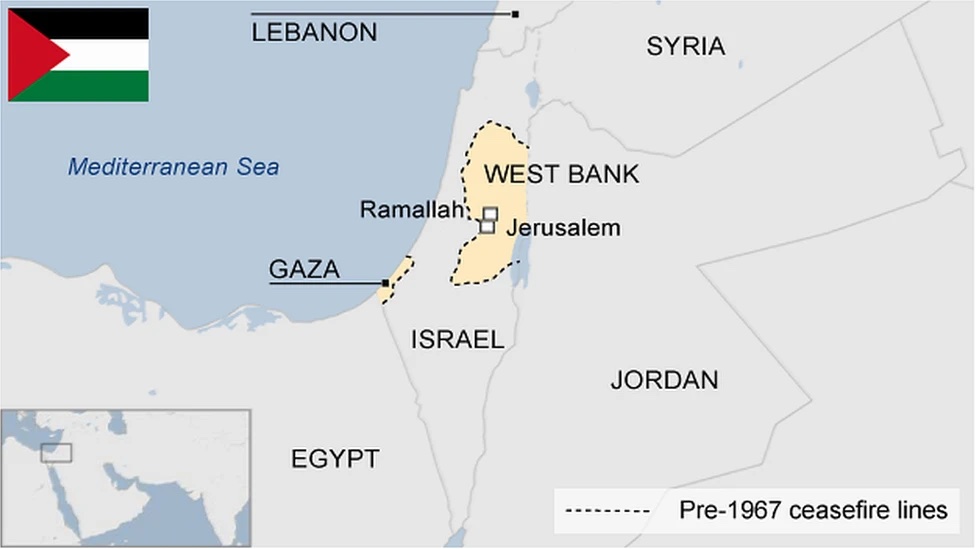
Palestine

In 2024, nine countries formally recognized the State of Palestine, marking a significant development in international law and diplomacy. These recognitions, some driven by broader foreign policy objectives and others by immediate geopolitical events, increased the total number of United Nations member states recognizing Palestine to 146. While this growing support strengthens Palestine’s claims to statehood, it also raises complex legal questions concerning state succession, treaty obligations, and diplomatic relations. The recognition influences Palestine’s ability to enter international agreements, assert sovereign rights, and seek full United Nations membership, yet discrepancies in recognition continue to create legal ambiguities.
Nine countries – Barbados, Jamaica, Armenia, Slovenia, Ireland, Norway, Spain, the Bahamas, Trinidad and Tobago – formally recognised the State of Palestine, reflecting growing international support. While some of these recognitions were unconditional, others did so in response to specific events or as part of broader foreign policy objectives
Barbados and the Bahamas: Both countries recognized the State of Palestine in 20 April and 8 May 2024 respectively, aligning with their foreign policy objectives to support Palestinian self-determination.
Jamaica: Jamaica officially recognized the State of Palestine on 24 April 2024, following discussions by its Cabinet. The decision was influenced by concerns over the war in Gaza and the escalating humanitarian crisis.
Trinidad and Tobago: Trinidad and Tobago established diplomatic relations with the State of Palestine on 3 May 2024. This move was part of the country’s ongoing support for Palestinian self-determination.
Ireland, Norway, and Spain: These countries officially recognised the State of Palestine on May 28, 2024. Their decisions were largely symbolic, aiming to support a two-state solution to the Israeli-Palestinian conflict. Norwegian Prime Minister Jonas Gahr Støre stated that the recognition was “an investment in the only solution that can bring lasting peace in the Middle East.”
Slovenia: Slovenian lawmakers approved the recognition of the State of Palestine on 4 June 2024. This decision was part of Slovenia’s broader foreign policy stance, reflecting its support for Palestinian self-determination.
Armenia: Armenia unilaterally recognised Palestinian statehood in 21 June 2024, becoming the ninth country to do so. This move was a direct response to the Gaza War.
State Succession and Recognition Issues
Unlike typical cases of state succession, where a new state emerges from a clearly defined predecessor, Palestine’s case does not fit neatly into traditional state succession models. Palestine does not have a single, clear predecessor state in the way that traditional cases of state succession do. Its historical and legal development is shaped by the Ottoman Empire, British Mandate, Jordanian and Egyptian rule, and Israeli occupation, making its statehood claim and succession issues legally unique and complex.
Nevertheless, from a state succession perspective, the recognition of Palestine as a sovereign state carries significant implications. Recognition by other states can solidify Palestine’s status as a sovereign entity, enabling it to enter into treaties, join international organisations, and exercise rights and responsibilities under international law. This recognition also affirms Palestine’s identity and existence as a state, which is crucial for its participation in the international community.
The recognition by additional countries may bolster Palestine’s claims to statehood, but it does not automatically resolve these underlying issues. The international community’s role in facilitating negotiations and supporting the peaceful resolution of disputes remains critical in this context.
While European recognitions bolster Palestine’s legal status, the lack of recognition by major powers, including the United States and several key Asian countries, creates legal ambiguities. Discrepancies in recognition may impact the enforceability of agreements and diplomatic engagements. Recognising states may need to adjust their legal frameworks to reflect Palestine as a sovereign entity, affecting visa regimes, trade regulations, and diplomatic protocols.
However, the process of state succession also involves complex issues such as the assumption of international obligations, the management of existing treaties, and the resolution of territorial disputes. For Palestine, these challenges are particularly pronounced given the ongoing Israeli-Palestinian conflict and disputes over borders and governance.
Legal and Diplomatic Consequences
As a recognised state, Palestine may claim succession to international treaties applicable to its territory. Notably, it is already a party to several human rights conventions and the Rome Statute of the International Criminal Court. Formal recognition enhances Palestine’s ability to accede to multilateral agreements such as the Vienna Convention on Diplomatic Relations.
Recognition along pre-1967 borders affirms Palestinian jurisdiction over the West Bank, Gaza, and East Jerusalem, though these areas remain contested. Legal claims regarding Israeli settlements and resource exploitation in occupied territories are likely to gain more international attention.
The recognition challenges the continued relevance of the Oslo framework of 1993, which defined Palestine as a self-governing entity. Palestine may argue for the renegotiation or invalidation of provisions that undermine its sovereign rights.
Recognition may necessitate renegotiation of bilateral treaties previously dependent on Palestine’s ambiguous legal status. Palestine may assert that its upgraded status renders previous agreements void or necessitates their renegotiation.
Recognition by the nine mentioned States formalises Palestine’s ability to establish diplomatic missions and exercise sovereign privileges in recognised States. This also strengthens Palestine’s ability to claim sovereign immunity in international legal disputes.
Commercial Implications, Financial and Debt Obligations
Private commercial contracts remain valid, but recognition may lead to jurisdictional ambiguities, especially in cross-border agreements involving Israeli entities. Palestinian authorities may seek to renegotiate contracts signed under the Palestinian Authority framework.
Recognition strengthens Palestine’s position to join regional and international trade agreements. Potential access to the European Union’s trade schemes for developing economies may be facilitated.
Legal questions may arise regarding the assumption of financial obligations incurred by the Palestinian Authority. International lenders may seek clarification on debt liability and sovereign guarantees. Enhanced recognition provides a more stable legal environment for foreign investors, who may seek assurances under bilateral investment treaties. Potential exposure to investor-state disputes if Palestine enters investment treaties with arbitration clauses.
Membership in International Organisations and Dispute Resolution
Recognition by European states strengthens Palestine’s case for full UN membership, which has been hindered by US and Israeli opposition. Enhanced diplomatic support may lead to increased participation in General Assembly votes and other UN functions. Palestine may seek to join additional specialised agencies such as the World Trade Organisation and the World Intellectual Property Organisation. Its current status in UNESCO and other agencies provides a precedent for further institutional integration.
Palestine’s recognition may bolster its ability to bring legal cases before international courts as well, such as the International Court of Justice and the International Criminal Court. Palestine may gain access to international arbitration mechanisms as well. Enhanced legal standing could lead to more active participation in cases involving territorial disputes, trade issues, and human rights violations. Palestine’s potential entry into investment treaties could expose it to investor-state dispute settlement claims.
In summary, the recognition of Palestine by additional nine states in 2024 enhances its standing in the international community and has significant implications from a state succession perspective. While it strengthens Palestine’s claims to sovereignty and statehood, it also brings to the forefront complex legal and political challenges that require continued international support and careful navigation.
Sources: aljazeera, bbc, france24, apnews, foreignpolicy, jpost
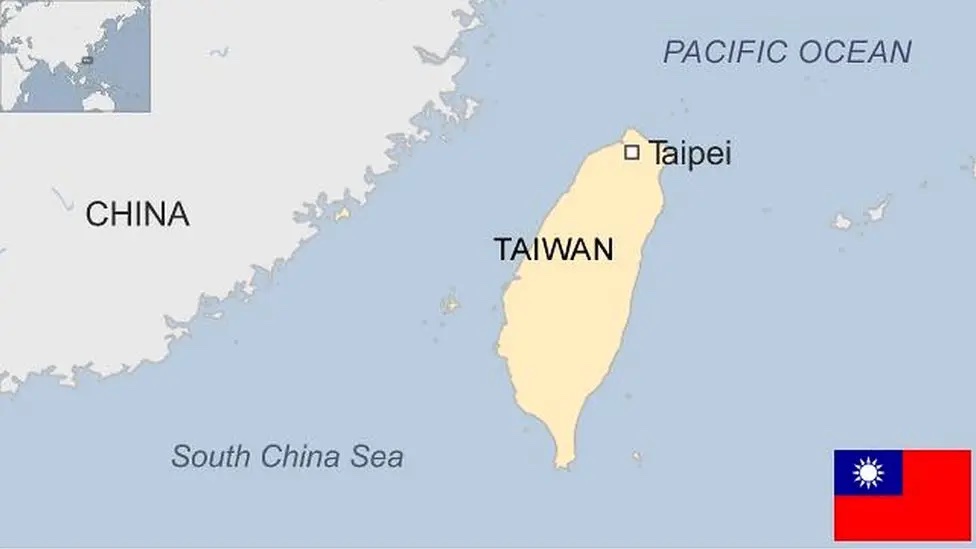
Taiwan

In 2024, Taiwan’s precarious statehood status faced renewed scrutiny as Nauru withdrew its recognition, reinforcing Taiwan’s complex position in state succession. With only 12 states maintaining formal recognition, Taiwan operates in a legal gray area—functioning as a self-governing entity while lacking broad international acknowledgment. The loss of recognition highlights the challenges of contested statehood. Despite its exclusion from major international institutions, Taiwan continues to assert de facto sovereignty, negotiating trade agreements and engaging in diplomatic efforts under alternative frameworks.
China sees self-ruled Taiwan as a breakaway province that will eventually be under Beijing’s control. China’s President Xi Jinping has said “reunification” with Taiwan “must be fulfilled” – and has not ruled out the possible use of force to achieve this. But Taiwan sees itself as distinct from the Chinese mainland, with its own constitution and democratically-elected leaders.
At the beginning of 2024 Taiwan lost one more State that recognised it as an independent State. On 15 January 2024, the Nauru government stated that “in the best interests” of the country and its people it was seeking full resumption of diplomatic relations with China. “This means that the Republic of Nauru will no longer recognise the Republic of China (Taiwan) as a separate country but rather as an inalienable part of China’s territory,” it said in a statement. In result, only 12 States, including the Holy See (Vatican City), recognise Taiwan as an independent State.
Taiwan’s ambiguous legal status continues to create challenges for states attempting to maintain diplomatic and economic relations without provoking China. Countries like Lithuania and Japan have found creative diplomatic solutions to engage with Taiwan without formal recognition. States enhancing ties with Taiwan face diplomatic and economic repercussions from China. Taiwan as well faced increasing international scrutiny and diplomatic pressure from China in 2024, as tensions in the Taiwan Strait continued to escalate.
Legal Consequences
Taiwan remains excluded from most formal international treaties due to its ambiguous international status. Nevertheless, it participates in numerous technical agreements under the name “Chinese Taipei,” particularly in trade and health sectors.
Legal disputes with China over territorial waters and airspace continued, with Taiwan asserting its claims under international maritime law. The lack of formal recognition complicates Taiwan’s ability to engage in territorial dispute resolution mechanisms.
Economic, Financial and Commercial Implications
Taiwan pursued new trade agreements in 2024, notably with the European Union and several Southeast Asian nations. The recognition issue remains a barrier to formal free trade agreements, but Taiwan successfully negotiated economic cooperation frameworks.
Despite political challenges, Taiwan continued to attract significant foreign investment, particularly in semiconductor manufacturing. Taiwan’s recognition as a critical player in global technology supply chains has bolstered its commercial influence.
Taiwan’s financial markets remained stable despite geopolitical tensions. The government continued to issue sovereign bonds without legal impediments, benefiting from investor confidence.
International Institutional Memberships and Dispute Resolution
Taiwan remained excluded from the United Nations but continued its active participation in the World Trade Organization and APEC. Efforts to gain observer status at the World Health Organization were blocked by China. At the same time Taiwan strengthened its ties with regional economic forums and participated in Track 2 diplomacy initiatives.
Taiwan’s legal standing in investor-state dispute mechanisms remained intact despite its ambiguous international status. Continued tensions with China over maritime boundaries and sovereignty in the South China Sea posed legal challenges.
Thus, despite a lack of formal recognition, Taiwan remains a critical international actor navigating legal, commercial, and political challenges.
Sources: abc, bbc
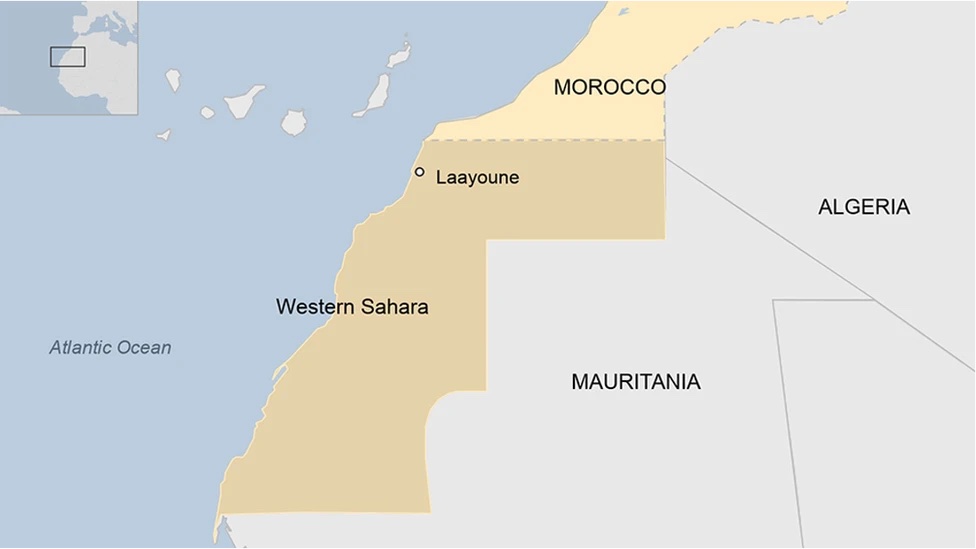
Western Sahara

The Sahrawi Arab Democratic Republic, or Western Sahara, appears to be gradually but steadily losing ground in its long battle for independence from Morocco. France’s recognition of Morocco’s sovereignty over Western Sahara in 2024 marks a significant moment in the ongoing state succession debate surrounding the territory. This policy shift strengthens Morocco’s claim while undermining the legal standing of the Western Sahara which has long sought recognition as an independent state. From a state succession perspective, France’s decision aligns with a broader trend of international actors consolidating support for Morocco’s control, potentially reshaping the legal framework governing Western Sahara’s status. The implications extend beyond legal recognition, influencing commercial and diplomatic engagements.
On 30 July 2024 France recognises a plan for autonomy for the Western Sahara region under Moroccan sovereignty as the only way of resolving a long-running dispute over the territory, President Emmanuel Macron said in a letter. France’s recognition of Morocco’s sovereignty over Western Sahara has significant implications from a state succession perspective. This policy shift aligns France with Morocco’s 2007 autonomy plan, which proposes granting Western Sahara substantial self-governance under Moroccan sovereignty.
Impact on the Sahrawi Arab Democratic Republic
The Sahrawi Arab Democratic Republic (SADR), proclaimed by the Polisario Front in 1976, claims sovereignty over Western Sahara. France’s recognition of Morocco’s sovereignty effectively undermines the SADR’s claim to the territory. This recognition suggests that the international community increasingly views Morocco as the legitimate sovereign over Western Sahara, thereby diminishing the legal standing of the SADR.
The Polisario Front, which has historically advocated for the independence of Western Sahara, faces a more challenging diplomatic environment. With key international actors, including France, supporting Morocco’s autonomy plan, the Polisario Front’s efforts to gain recognition for an independent Sahrawi state are further complicated.
Legal Consequences
From a state succession perspective, France’s recognition of Morocco’s sovereignty over Western Sahara strengthens a trend for other nations, potentially leading to broader international consensus on Morocco’s control of the territory. This shift will affect future negotiations and the legal framework surrounding Western Sahara’s status.
The recognition may alter the legal standing of the SADR, which is considered to represent the Sahrawi people. If Morocco’s sovereignty becomes the accepted norm, the Sahrawi cause could be seen as less aligned with legal claims to self-determination, weakening future independence or autonomy claims.
France’s position could influence other states to reconsider their stance, strengthening Morocco’s position in the UN and international courts. This might lead to a long-term resolution, solidifying Morocco’s control. However, it may also create friction with countries like Algeria that support the Polisario Front, impacting UN decolonization discussions.
Morocco’s position may be legally strengthened in any future negotiations. With a major player like France on its side, Morocco might hold an upper hand in any peace talks, which could prioritize its sovereignty claims over potential concessions to the Sahrawi people. In terms of state succession, Morocco might gain full control over territorial assets that are disputed (natural resources, infrastructure) after a prolonged settlement agreement, which could limit future claims by the SADR.
Commercial Consequences
One of the most significant commercial consequences relates to the natural resources of Western Sahara, particularly phosphate deposits and fisheries. France’s recognition of Moroccan sovereignty could pave the way for greater French and European companies to invest in and exploit these resources without facing the same legal challenges they would have had if Morocco’s sovereignty had been contested. French companies, for example, may become more involved in the mining of phosphate and fishing industries in Western Sahara, as the recognition could reduce legal risks of resource extraction from a disputed territory.
The recognition may also lead to more solidified commercial ties between France and Morocco, particularly in sectors like agriculture, energy, and infrastructure. Companies in France may deepen their investments in Morocco, including in the Sahara region, as a result of the perception that Morocco’s control over the territory is now legally and diplomatically affirmed. This could attract new trade agreements and foreign investment deals under the assumption that Moroccan sovereignty is legitimate and stable.
In 2024, several French companies expanded their operations in Western Sahara, following France’s recognition of Morocco’s sovereignty over the territory. The 22 deals followed French recognition of Morocco’s claims to the Western Sahara territory. Notable developments include MGH Energy’s Fuel Production Plans: MGH Energy, a French company focused on decarbonizing transportation, announced plans to partner with Petrom, a Moroccan distributor, to produce fuel near Dakhla, the second-largest city in Western Sahara. This collaboration is part of a broader investment strategy to support Morocco’s development in the region.
France’s investments will expand Morocco’s footprint in the 80% of the territory under its control, complementing its efforts to develop the territory and incentivize Moroccans from other parts of the country to move there.
If other European Union member states follow France’s lead, this could result in the EU recognizing Morocco’s claims to Western Sahara, opening the way for expanded trade agreements. This could also have significant implications for EU trade policy, particularly in relation to agricultural products and natural resources sourced from the region, which have been a subject of legal disputes in the EU courts due to Western Sahara’s contested status.
Conclusion
From both a legal and commercial perspective, France’s recognition of Morocco’s sovereignty over Western Sahara has broad implications:
- Legally, it solidifies Morocco’s territorial integrity and could shift international opinion in favour of Morocco’s claim to the region, reducing support for the SADR and the Polisario Front.
- Commercially, it opens the door to increased business activity in the region, particularly in resource extraction, infrastructure, and trade, with French and potentially European companies likely to become more involved in the Sahara.
These shifts reflect broader trends in international law and state succession, with France’s recognition potentially influencing other countries and international bodies to adopt Morocco’s position.
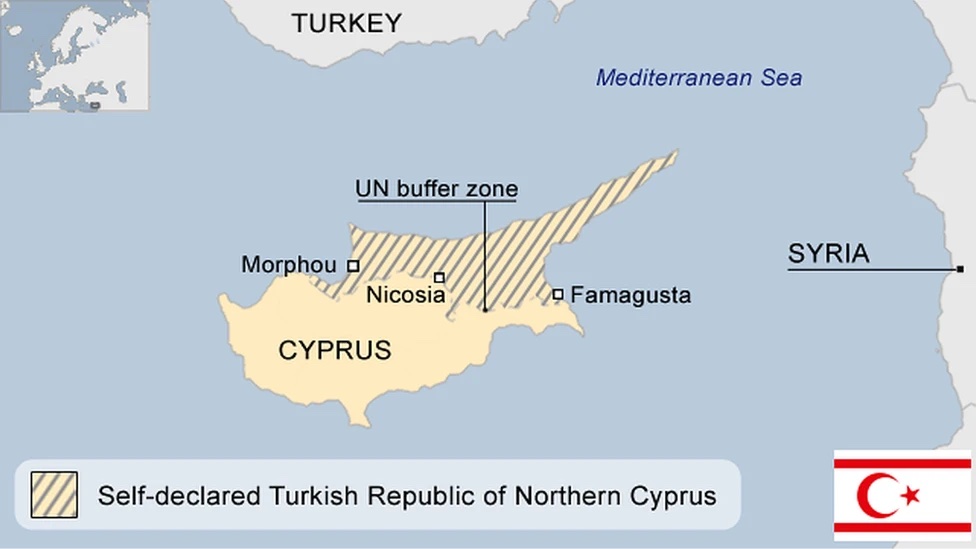
Northern Cyprus

The Turkish Republic of Northern Cyprus intensified efforts to gain international recognition, focusing on strengthening ties with Turkic nations and advocating for a two-state solution to the Cyprus issue.
The President of the Turkish Republic of Northern Cyprus (TRNC) Ersin Tatar emphasized the need for international recognition of Northern Cyprus as an independent state, dismissing reunification efforts as unproductive. He suggested that countries such as Azerbaijan, Pakistan, and Bangladesh might consider recognising the Northern Cyprus.
Turkish Position on Norther Cyprus Recognition
Turkey has consistently been the sole state to officially recognise Northern Cyprus since its declaration of independence in 1983. In 2024, Turkey’s stance was more assertive than ever in its diplomatic support:
– Turkey announced new investments in Northern Cyprus, including infrastructure projects and direct trade agreements to bolster the Northern Cyprus’s economy.
– Turkish President Recep Tayyip Erdoğan used multiple international platforms, including the UN General Assembly, to advocate for Northern Cyprus recognition. He highlighted that the ongoing international embargoes against Northern Cyprus were unjust and counterproductive.
– Turkey leveraged its influence within the Organisation of Turkic States to advocate for broader regional support for the Northern Cyprus. Turkish diplomats reportedly engaged in high-level discussions with Azerbaijan, Kazakhstan, and Uzbekistan to consider steps toward formal recognition or enhanced engagement with the TRNC.
– Turkey’s growing assertiveness led to further tensions with the European Union. EU officials reiterated that Turkey’s support for the two-state solution undermined peace efforts.
Azerbaijan’s Position
Azerbaijan’s relationship with the TRNC has been complex. While the Nakhchivan Autonomous Republic, an exclave of Azerbaijan, recognised the Northern Cyprus in the mid-1990s, Azerbaijan has refrained from official recognition due to concerns over the Nagorno-Karabakh issue. In 2024, high-level contacts between Azerbaijan and Northern Cyprus increased, with Northern Cyprus officials expressing hope for future recognition.
Engagement with Turkic States
A significant development occurred when the Organisation of Turkic States granted observer status to the Northern Cyprus during its summit in Bishkek, Kyrgyzstan. This move was seen as an attempt to legitimise Northern Cyprus on the international stage. The European Union stated that it ‘rejects the repeated attempts by the Organisation of Turkic States (OTS) to legitimise the Turkish Cypriot secessionist entity, the so-called, internationally not recognised, “Turkish Republic of Northern Cyprus” (“TRNC”), through granting OTS observer status, including at its summit taking place in Bishkek (Kyrgyz Republic)’ on 7 November 2024. However, the European Union denounced this action, reaffirming its stance that the Republic of Cyprus is the only internationally recognized authority on the island.
The engagement of the Northern Cyprus in the Organisation of Turkic States and its participation in meetings in 2024 carries several implications from a state succession perspective:
TRNC’s observer status and participation in OTS meetings suggest symbolic recognition from member states. While this does not constitute formal diplomatic recognition, it provides a significant political platform for TRNC’s assertion as a distinct political entity. Involving TRNC in regional organisations like OTS may create a pathway for other international engagements, contributing to a gradual legitimization process.
Participation in international or regional organisations undermines the legal and political principle maintained by the UN and the EU that Cyprus is a single sovereign entity represented solely by the Republic of Cyprus. This move contradicts the UN’s preference for a bizonal, bicommunal federation and may be used by the TRNC and Turkey to bolster their argument for a two-state solution.
Treaty Succession and International Law
Due to its non-recognised status, TRNC is excluded from most international treaties and organisations. Its participation in OTS meetings might signal an attempt to build a parallel diplomatic and treaty framework with friendly states, especially Turkic nations. This engagement may solidify a precedent where TRNC seeks international arrangements independently, which could be viewed as an erosion of Cyprus’ territorial integrity and sovereignty under international law.
Economic and Commercial Implications
Participation in OTS meetings may facilitate new trade and investment agreements with member states, especially Turkey, Kazakhstan, Uzbekistan, and Kyrgyzstan. Continued engagement in regional economic initiatives can contribute to the development of Northern Cyprus’ economic identity, strengthening its case for de facto statehood.
By the end of 2024, there was no publicly available information regarding specific events or investments from member states of the OTS into the TRNC following the 11th OTS Summit held on November 6, 2024. While the summit, which took place in Bishkek, Kyrgyzstan, included discussions on economic integration and sustainable development among Turkic nations, no detailed announcements have been made concerning direct investments or collaborative projects involving the Northern Cyprus.
Conclusion
Despite proactive diplomatic efforts in 2024, the Northern Cyprus remains recognized only by Turkey. However, from a state succession perspective, the TRNC’s engagement with the OTS in 2024 marks a significant step toward enhancing its diplomatic visibility and legitimacy. However, it also risks further entrenching divisions on the Cyprus issue, undermining international legal frameworks supporting Cyprus’ territorial integrity. The implications will depend on whether this engagement remains symbolic or evolves into formal cooperation and trade agreements with Organization of Turkic States members.
Sources: eeas.europa.eu, reuters, turkishminute, turkicstates
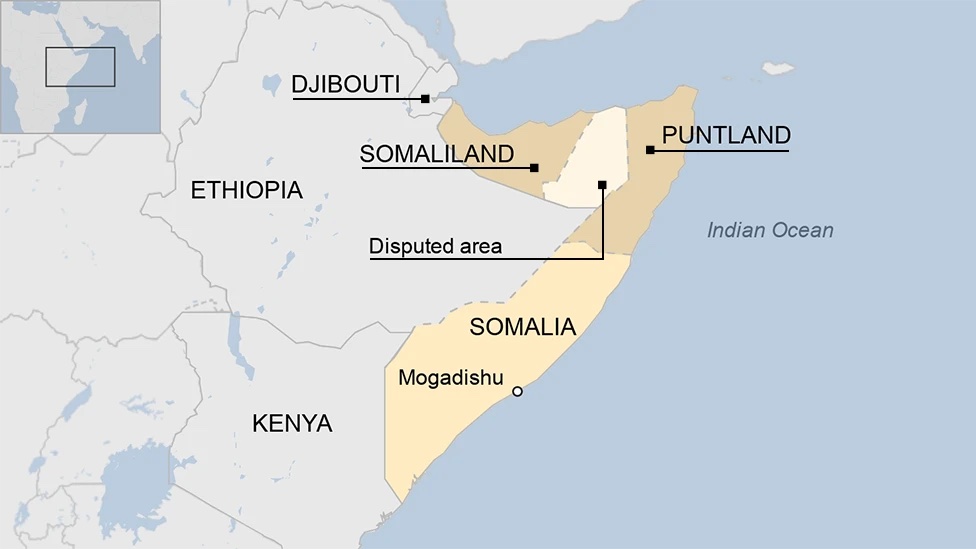
Somaliland

Ethiopia’s 2024 Memorandum of Understanding with Somaliland marked a potential breakthrough in Somaliland’s long-standing quest for recognition, as Ethiopia signaled future recognition in exchange for port access. However, strong opposition from Somalia and regional actors led to diplomatic tensions, ultimately forcing Ethiopia to reaffirm Somalia’s sovereignty. Meanwhile, the UK and U.S. saw renewed debates on Somaliland’s recognition, reflecting shifting international engagement.
On January 1, 2024, Ethiopian Prime Minister Abiy Ahmed and Somaliland President Muse Bihi Abdi signed a Memorandum of Understanding (MoU) granting Ethiopia access to over 19 kilometers of Somaliland’s coastline near Berbera. In exchange, Ethiopia agreed to recognize Somaliland as an independent state in the future, potentially making it the first United Nations member to do so.
The MoU faced immediate opposition from Somalia, which considers Somaliland part of its territory. Somalia recalled its ambassador to Ethiopia and demanded a public withdrawal from the agreement. The dispute also raised concerns about Ethiopian participation in the African Union Support and Stabilisation Mission in Somalia.
In December 2024, following Turkish-brokered talks, Ethiopia and Somalia agreed to end their dispute over Ethiopia’s plan to build a port in Somaliland. The agreement emphasised mutual respect for sovereignty and the pursuit of commercial arrangements for Ethiopia’s sea access under Somalia’s sovereignty. Notably, the MoU was not mentioned in the agreement, and Somaliland maintains that the original agreement with Ethiopia remains valid.
As of early 2025, Ethiopia and Somalia have agreed to restore diplomatic ties after a year-long rift triggered by the Ethiopia-Somaliland agreement. Ethiopia has committed to engaging with Somaliland only with Somalia’s permission, signalling a shift in its approach to the region.
Thus, while the initial MoU between Ethiopia and Somaliland indicated a potential pathway to Somaliland’s recognition, regional opposition and subsequent diplomatic negotiations have complicated its implementation. The outcome remains uncertain, with Ethiopia reaffirming its commitment to Somalia’s sovereignty and the original MoU’s status in question.
Throughout 2024, the United Kingdom and the United States exhibited increased engagement regarding the recognition of Somaliland, though neither country officially recognised its independence.
United Kingdom:
- Parliamentary Advocacy: In January 2024, UK Member of Parliament (MP) Alexander Stafford emphasised the UK’s moral obligation to recognise Somaliland, highlighting its democratic governance and stability.
- Parliamentary Debates: On October 10, 2024, the House of Lords debated Somaliland’s recognition, with Baroness Hoey advocating for acknowledgment of Somaliland’s self-declared independence since 1991. The government maintained its position of non-recognition during this debate.
- Renewed Advocacy: In December 2024, MP Gavin Williamson renewed efforts to support Somaliland’s recognition, citing its peaceful and transparent presidential election held on November 13, 2024.
United States:
- Legislative Initiatives: On December 12, 2024, Congressman Scott Perry introduced a bill to the U.S. Congress proposing formal recognition of Somaliland as a sovereign state. The bill was forwarded to the House Foreign Affairs Committee for consideration.
- Strategic Proposals: Somaliland expressed readiness to host a U.S. military base in Berbera, aiming to strengthen bilateral relations and bolster its case for recognition.
- Executive Branch Engagement: Former UK Defence Minister Sir Michael Fallon suggested that former President Donald Trump might consider recognising Somaliland’s independence, indicating potential shifts in U.S. policy depending on political leadership.
From a state succession perspective, the MoU offers several significant lessons and insights into the dynamics of recognition and succession:
Geostrategic Importance and Resource Potential
Somaliland’s position along the Gulf of Aden and proximity to international shipping lanes makes it a vital location for trade and logistics, particularly as regional trade expands.
The MoU granting Ethiopia access to the Berbera corridor signals its growing role as a regional trade hub. Ongoing investments, such as the DP World-led port development with $442 mln. investment, are transforming Berbera into a major commercial and logistics hub.
Somaliland possesses untapped reserves of oil and gas, attracting interest from exploration companies such as Genel Energy and other international firms. The region also has potential for renewable energy projects, particularly wind and solar energy, which are becoming increasingly attractive due to global sustainability trends.
Political and Legal Stability
Compared to other parts of Somalia, Somaliland has maintained a relatively stable and peaceful political environment, with functioning democratic institutions and a clear legal framework for business. Despite its de facto independence, Somaliland’s lack of widespread international recognition creates legal ambiguities for investors. Contract enforcement and access to international arbitration could be more challenging.
Somaliland offers tax incentives, simplified regulatory procedures, and an open investment framework aimed at attracting foreign direct investment. The absence of an internationally recognized currency and limited access to global banking networks pose challenges for financial transactions.
The ongoing lack of international recognition creates diplomatic risks as well, especially for investors dealing with cross-border agreements. Investors must consider the potential for legal disputes if Somalia asserts jurisdiction over projects or claims Somaliland’s resources.
Conclusion
Potential investors should pay attention to Somaliland given its strategic location, relative stability, and emerging economic potential. However, legal ambiguities, diplomatic disputes, and financial risks require a cautious and well-informed approach. As Somaliland continues to seek international recognition and strengthen its regulatory environment, the investment landscape is likely to become more attractive and secure.
Sources: bbc, ethiopianstoday.com, news-pravda.com, politics.co.uk, somalilandchronicle.com, saxafimedia.com, horndiplomat.com, stripes.com, somalilandbiz, theguardian
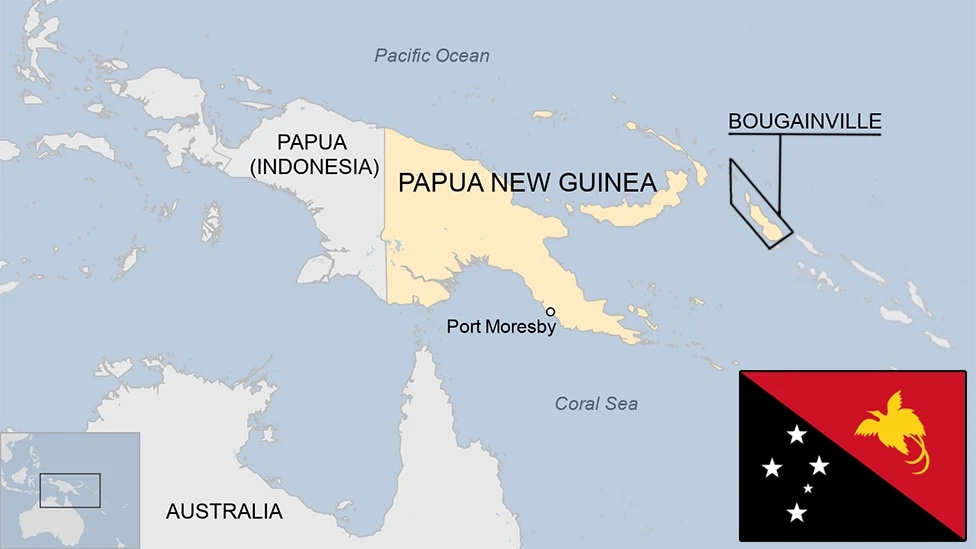
Bougainville

Bougainville’s progress toward statehood in 2024 reflects a determined effort to transition from autonomy to full independence from Papua New Guinea. With the drafting of its independence constitution and ongoing negotiations under the Era Kone Covenant, Bougainville is laying the legal and diplomatic groundwork for secession. However, PNG’s parliamentary ratification remains a critical hurdle and the appointment of a mediator underscores the need for careful diplomatic engagement.
In 2024, Bougainville made significant strides toward achieving full independence from Papua New Guinea (PNG), building upon the 2019 referendum where 97.7% of voters favoured secession. Throughout 2024, Bougainville demonstrated a clear commitment to establishing itself as an independent nation, engaging in constitutional development, negotiations with PNG, and mobilizing public support to realize its long-held aspirations. Key developments throughout the year include:
Drafting of the Independence Constitution
On May 6, 2024, the Autonomous Bougainville Government (ABG) unveiled the first draft of its proposed independence constitution. This draft, developed by the Bougainville Constitutional Planning Commission, represents a pivotal step in formalizing the legal framework for a sovereign Bougainville. Following the release, the ABG initiated extensive consultations with Bougainvilleans, including diaspora communities, to gather feedback and ensure the constitution reflects the collective aspirations of its people.
Negotiations with Papua New Guinea
The Era Kone Covenant, finalized in April 2022, outlined a framework for Bougainville’s potential independence between 2025 and 2027. In 2024, both the ABG and PNG’s national government continued discussions to operationalize this agreement, focusing on the ratification process and timelines. In mid-2024, PNG’s government expressed intentions to present the 2019 referendum results to its Parliament, likely on early 2025. However, concerns persist about the level of parliamentary support for Bougainville’s independence, given fears of potential national fragmentation.
Statements from Bougainville Leadership
Bougainville’s leadership remained steadfast in their pursuit of sovereignty. President Ishmael Toroama emphasized the region’s resolve, stating, “We are laying the foundation for Bougainville’s future as a sovereign, independent nation—a future that has been dreamed of, fought for, and bled for by generations of our people.” In November 2024, President Toroama urged PNG to address Bougainville’s independence aspirations directly, advocating for transparent and decisive action rather than prolonged political deliberation.
Negotiations Moderator
In May 2024, Sir Jerry Mateparae, former Governor-General of New Zealand, was appointed as the independent moderator to facilitate discussions between the PNG government and the ABG regarding Bougainville’s political future. Sir Jerry’s role involves supporting both governments in resolving outstanding issues concerning Bougainville’s future, aiming to sustain the peace and progress achieved over the past 25 years. Following his appointment, Sir Jerry engaged with key stakeholders from both the PNG government and the ABG to understand their perspectives and establish a foundation for effective mediation.
In November 2024, Sir Jerry visited Bougainville, traveling to districts such as Chabai, Arawa, Bana, and Tsiroge. During this visit, he held consultations and public engagements with regional leaders, including representatives of women, youth, and churches. The visit concluded with meetings in Buka with the Speaker of the Bougainville House of Representatives and other senior ABG officials.
Throughout his tenure, Sir Jerry facilitated discussions between the PNG government and the ABG, focusing on addressing contentious issues and fostering mutual understanding to advance the post-referendum process.
Next Steps in Bougainville’s Independence Path (2024 Onward)
Bougainville’s path toward statehood is guided by key political, legal, and diplomatic milestones outlined in agreements with PNG and influenced by regional and international dynamics. Below are the expected steps for the remaining transition:
PNG’s National Parliament is expected to debate and formally vote on the ratification of Bougainville’s independence referendum results in 2025. Political divisions in PNG’s parliament and concerns over setting a precedent for other autonomous regions could delay or complicate this process. Continued mediation by Sir Jerry Mateparae and pressure from regional allies, including New Zealand and Australia, are likely to support a peaceful endorsement process.
The next steps in Bougainville’s independence path are politically complex but offer a roadmap to full statehood by 2027. Success will require careful negotiation, robust institutional development, and strong regional and international support.
Sources: abg, bbc, beehive.govt.nz, pina, post-courier, rnz
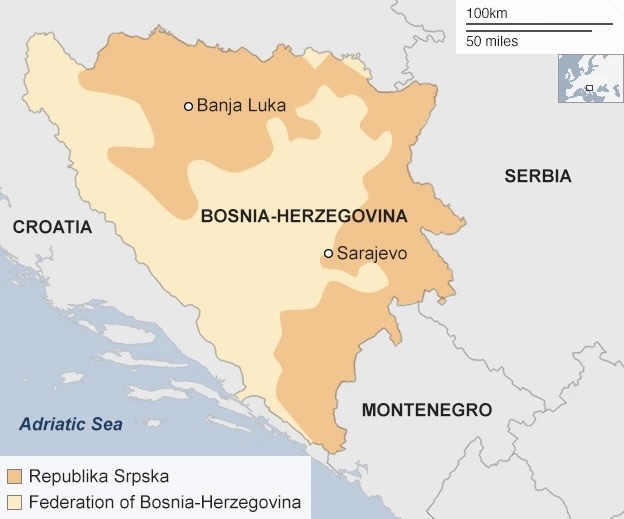
Srpska

Republika Srpska intensified its secessionist efforts, challenging Bosnia and Herzegovina’s territorial integrity. Under President Milorad Dodik, Srpska established parallel institutions and proposed an independence referendum, deepening Bosnia’s political crisis. Secession could disrupt treaty succession, international recognition, and Bosnia and Herzegovina’s continuity as a state, highlighting the legal complexities of unilateral secession in international law.
In 2024, Republika Srpska (Srpska), the Serb-majority entity within Bosnia and Herzegovina (BiH), intensified its efforts toward secession and potential unification with Serbia. Under the leadership of President Milorad Dodik, several key developments unfolded:
In January 2024, Srpska authorities initiated the establishment of independent institutions, including their own electoral commission, a move widely interpreted as a step toward secession.
In April, Srpska President Dodik emphasized the idea of uniting Srpska with Serbia, suggesting that the current constitutional framework established by the Dayton Agreement had outlived its purpose. He portrayed unification as a natural progression for the Serb population in the region.
By June, Dodik announced plans to hold a referendum on Srpska’s independence from BiH, though no specific date was set. He indicated that thorough analyses were necessary before proceeding, but affirmed that the decision to separate had been made.
The constitutional court of BiH faces challenges in enforcing decisions within the Republika Srpska, as Srpskf leadership disputes the court’s legitimacy and decisions, leading to a potential constitutional crisis.
Srpska’s actions have impeded BiH’s progress toward European Union integration. In December 2024, Srpska lawmakers directed Serb representatives to obstruct decision-making processes essential for EU accession efforts.
These moves have heightened tensions within BiH and drawn significant international concern. The U.S. envoy to Sarajevo labeled Srpska’s actions as “secession by another name” and “based upon a set of lies,” warning that such steps could lead to the dissolution of the entity. In response to secessionist rhetoric and actions, the U.S. expanded sanctions against individuals and entities associated with Dodik, targeting those aiding in evading existing sanctions.
International Legal Status
Secession would likely face strong opposition from the international community, particularly from the European Union, the United States, and neighbouring Bosnia and Herzegovina. Non-recognition by key states would create legal ambiguities in treaty relationships and diplomatic engagement. Even if Srpska were to unilaterally declare independence, obtaining UN membership would require UN Security Council approval, where vetoes from countries opposing the secession (e.g., the U.S., France, or the UK) are likely.
Most likely, secession of Srpska will lead to dissolution of BiH as the rest of BiH is neither hold most of its territory, nor the population, and thus BiH could not get continuator status. This has been the most common outcome in the case of, for example, the dissolution of Czechoslovakia and creation of two new states of Czechia and Slovakia. Since BiH would not be the same state as the acting BiH, questions of state succession would arise to both BiH and Srpska.
Implications for State Succession and International Recognition
In terms of international treaties and agreements, the Vienna Convention on Succession of States in respect of Treaties suggests that successor states inherit treaties. However, Republika Srpska might reject treaties that do not align with its new political direction. This would disrupt the European integration process, including the Stabilization and Association Agreement with the EU. Additionally, bilateral agreements on borders, trade, investments and security would need to be renegotiated. Uncertainty surrounding legal and political stability would deter foreign direct investment as investors seek legal certainty, protection under international treaties, and enforceable arbitration mechanisms.
The rules of state succession to treaties generally do not apply to membership of international organisations; instead, membership depends on the particular rules and practices of the organisation. Both Srpska and the Federation of Bosnia and Herzegovina would likely seek membership in international organizations like the United Nations. However, Bosnia’s seat at these organizations may become contested, leading to legal and political complications. The EU and NATO memberships that Bosnia and Herzegovina has pursued would be interrupted. Republika Srpska’s secession would probably end or stall the EU integration process, and NATO’s involvement in peacekeeping operations would become politically untenable.
The economic and commercial consequences of secession would be far-reaching. Bosnia and Herzegovina uses the Convertible Mark, which is tied to the euro. Secession would necessitate new currency policies, potentially leading to economic instability. Legal uncertainties related to jurisdiction and state succession would likely discourage foreign investments in both Republika Srpska and the remaining BiH regions. Existing contracts between companies and individuals within Srpska and foreign entities may face enforceability issues if Srpskf is not internationally recognized. Jurisdiction and applicable legal frameworks could become contentious. Furthermore, the successor states would have to resolve how to allocate Bosnia’s national debt, which could lead to disputes. Republika Srpska would likely lose access to the EU’s preferential trade agreements unless it independently re-establishes them.
There would also be significant impacts on the population. Issues surrounding automatic citizenship transfers could arise, especially if Republika Srpska adopts Serbia’s nationality laws, creating potential complications with dual or multiple citizenships. Additionally, the secession could result in the migration of ethnic groups who would seek to reside in areas that align with their identity. Moreover, property rights could be challenged if new land and title registration systems emerge.
Lastly, unclear demarcation of borders between the successor states could lead to disputes, which would require international arbitration for resolution. Investors with contracts involving Bosnia and Herzegovina might face legal uncertainty regarding the enforceability of agreements in the new entities. Furthermore, disputes over state-owned properties, embassies, and other national assets would need to be settled under international law.
In conclusion, the potential secession of Republika Srpska and the dissolution of Bosnia and Herzegovina would create significant legal, economic, and social disruptions for both commercial arrangements and the population. The absence of international recognition would exacerbate these challenges, potentially leading to economic isolation and humanitarian concerns. From a state succession perspective, challenges surrounding treaty continuity, debt allocation, citizenship, and international recognition would require careful navigation to prevent instability and ensure legal certainty for the population and commercial entities.
Sources: bbc, reuters, rferl, thesrspskatimes
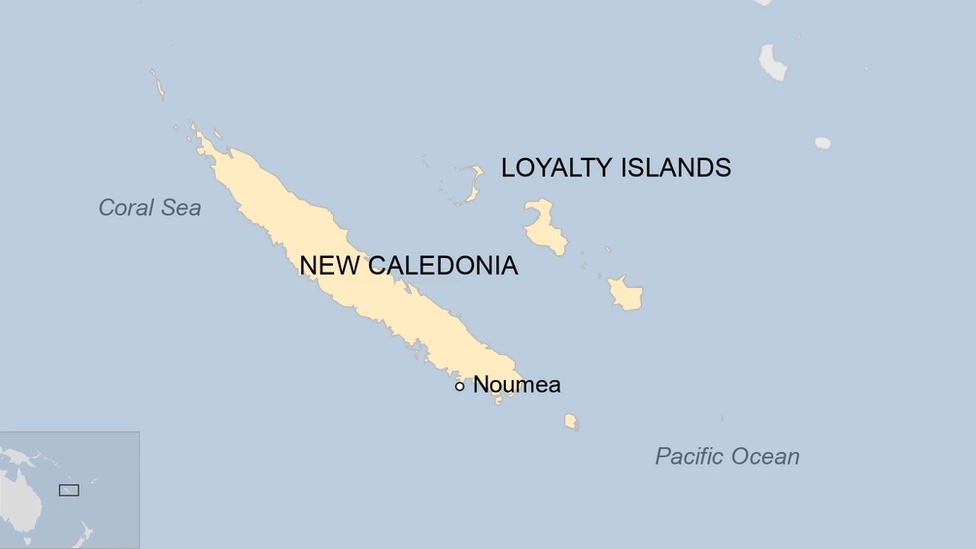
New Caledonia

In 2024, New Caledonia remains a significant focus in the context of state succession due to its evolving political status and ongoing discussions about independence. As a French overseas territory, New Caledonia’s trajectory is influenced by its complex relationship with France, ongoing referendum outcomes, and shifting regional dynamics in the Pacific. These developments continue to have significant implications for both regional stability and global political arrangements.
New Caledonia and State Succession Developments in 2024
New Caledonia, a French territory with special autonomous status, continued its path toward potential statehood in 2024. The events throughout the year were shaped by political negotiations, international diplomacy, and internal debates on the island’s future.
Following the third and final referendum in 2021, where 96.5% voted to remain part of France amid a boycott by pro-independence groups, tensions remained high. The 2024 talks sought to find a consensual framework for New Caledonia’s political future.
In 2024, New Caledonia experienced significant unrest related to proposed changes to its electoral system. The French government’s attempt to amend the constitution to expand voting rights to a broader segment of the population, including those with ten years of continuous residence, ignited widespread protests and riots.
Background of the Electoral Reform
In January 2024, the French government introduced a constitutional bill aimed at “unfreezing” the electorate in New Caledonia. This reform sought to include citizens who were either born in the territory or had resided there for at least ten years, thereby adding approximately 25,000 individuals to the electoral rolls. This change was intended to address the exclusion of about 42,000 residents from voting in provincial elections.
The proposed electoral changes were met with strong opposition from pro-independence groups, who viewed the reform as a threat to the political influence of the Indigenous Kanak population. In May 2024, protests escalated into violent riots, leading to the deaths of at least 13 individuals. The unrest prompted the French government to declare a state of emergency on May 16, deploying additional security forces to restore order.
In response to the escalating violence, French President Emmanuel Macron suspended the proposed electoral reform on June 12, 2024, acknowledging the need for further dialogue and consensus-building among New Caledonian political leaders.
A bloc of Pacific island leaders on 17 July 2024 condemned France’s “illegitimate” handling of the U.N-mandated decolonization of its Pacific territory New Caledonia and called for a further referendum on independence. In a statement, the five member Melanesian Spearhead Group – Fiji, Papua New Guinea, Solomon Islands, Vanuatu and the pro-independence FLNKS of New Caledonia – also denounced France’s militarization of New Caledonia after deadly riots erupted in May 2024.
Impact on State Succession
The events of 2024 underscored the complexities of New Caledonia’s political status and the challenges associated with its potential transition to full independence. The unrest highlighted deep-seated tensions between pro-independence and pro-French factions, as well as concerns over the representation and rights of the Indigenous Kanak people. The suspension of the electoral reform indicated the French government’s recognition of the need for a more inclusive and negotiated approach to the territory’s future governance.
These developments have significant implications for New Caledonia’s political trajectory, particularly regarding the ongoing discourse on self-determination and the pursuit of independence. The events of 2024 have intensified discussions on the territory’s future, emphasizing the necessity for comprehensive dialogue and consensus among all stakeholders to navigate the path toward self-determination and potential state succession.
Conclusion
As New Caledonia navigates its path toward potential independence, the developments in 2024 underscore the complex dynamics of state succession. The ongoing debates and referenda highlight the challenges and opportunities in determining self-determination and sovereignty. The outcomes of these efforts will be crucial in shaping the region’s political landscape and may set important precedents for similar territories considering their own future status.
Sources: bbc, lemonde, benarnews
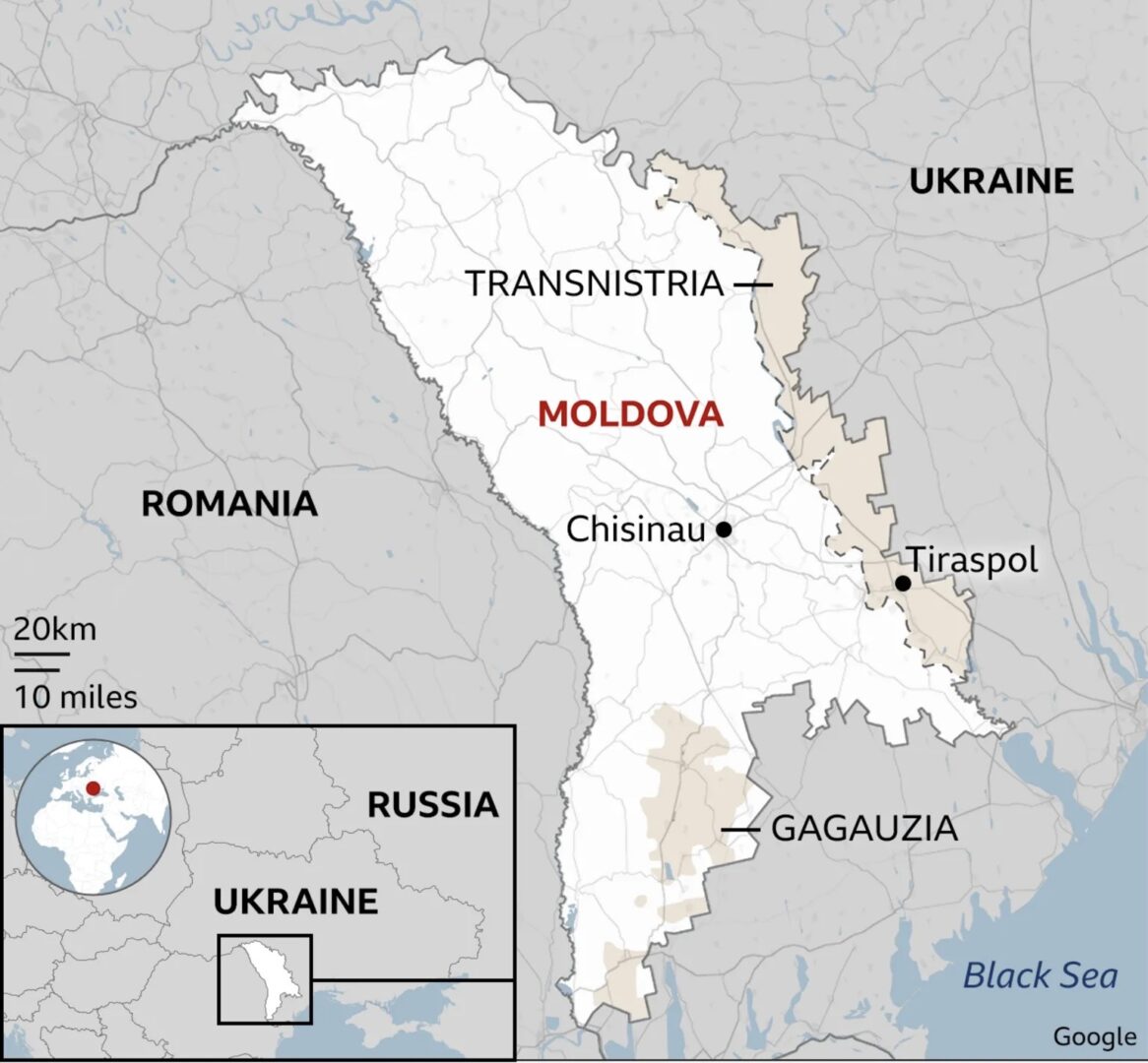
Gagauzia

Gagauzia’s statements and actions highlighted the complexities of state succession in the context of territorial integrity, sovereignty, and international recognition. As Moldova explored closer ties with Romania and the European Union, Gagauzia’s leadership threatened secession should Moldova pursue unification with Romania. From a state succession perspective, Gagauzia’s resistance to integration underscores the internal divisions that could reshape Moldova’s political future, legal obligations and territorial configuration.
In 2024, Gagauzia, an autonomous territorial unit within Moldova statements and actions in 2024 offer valuable insight into the complexities of state succession in the context of territorial integrity, sovereignty, and international recognition as well as significantly impacted the geopolitical discourse surrounding Moldova’s potential unification with Romania.
In April 2024, Romanian Prime Minister Ion-Marcel Ciolacu declared that he favours Moldova becoming a part of Romania and joining Western institutions. In response, Gagauzia Governor Evghenia Guțul made statements suggesting that Gagauzia might seek independence if Moldova were to unify with Romania. Gutsul responded that if Chisinau and Bucharest do move in that direction, her republic would declare independence. This independence rhetoric serves as a direct challenge to the broader aspirations of Moldova, which has been exploring closer ties with Romania and the European Union.
Guțul’s statements about Gagauzia’s potential secession underscore the region’s autonomy within Moldova, highlighting the internal divisions that complicate any effort toward Moldova-Romania unification. These divisions are crucial from a state succession perspective, as the region’s resistance to Romanian integration could act as a potential impediment to the reconfiguration of territorial boundaries and sovereignty.
Gagauzia’s Pro-Russian Stance
The region of Gagauzia has a strong pro-Russian orientation, with many of its inhabitants identifying more closely with Russia than with Romania. This geopolitical leaning has led Gagauzia’s leadership to seek Russian support for the region’s autonomy, further complicating Moldova’s internal cohesion as it seeks to navigate the prospect of joining the European Union or potentially unifying with Romania.
The Russian connection is central to understanding Gagauzia’s potential as a secessionist entity, as the region’s strategic alignment with Russia may lead it to seek Russian protection in the event of Moldova’s unification with Romania. This further illustrates the potential dissolution of Moldova’s territorial integrity, a fundamental concept within state succession dynamics.
Impact on Moldova-Romania Unification
Gagauzia’s independence statements create a significant challenge for the potential unification of Moldova and Romania, which is often viewed as a natural and historical outcome due to their shared language, culture, and heritage. If Moldova were to pursue unification with Romania, Gagauzia’s threat of secession would likely lead to complex diplomatic negotiations between Moldova, Romania, and potentially Russia, as Gagauzia’s resistance to integration would need to be addressed.
In the context of state succession, the resistance of a significant territorial entity (like Gagauzia) to join a newly unified state poses important questions about the future of the region’s sovereignty. Would Gagauzia remain autonomous, declare its independence, or seek protection from an external power such as Russia? These questions are pivotal to understanding the political viability of Moldova-Romania unification and any future state succession scenarios.
State Succession effect
If Gagauzia were to secede from Moldova, several key state succession issues would arise, impacting both Moldova’s territorial integrity and the broader regional geopolitical landscape.
Geopolitical Implications
The state succession scenario in Moldova hinges on how Gagauzia’s autonomy and potential secession are managed. The region’s stance could lead to a situation where Moldova is forced to address Gagauzia’s future, potentially involving a territorial realignment or a referendum on independence for the region. These events would add complexity to the broader state succession process in the region, especially if external powers like Russia influence the outcome.
Gagauzia’s actions emphasize the internal dynamics of state succession: while Moldova might seek to align itself with Romania and the EU, the secessionist aspirations of its autonomous regions could lead to fragmentation, possibly altering the political boundaries or even the legal identity of Moldova itself.
Continuity of Moldova as a State and Recognition Issues
Moldova would likely maintain its status as a continuing state, as Gagauzia constitutes only a small part of its territory and population. However, the loss of an autonomous region could set a precedent for further fragmentation, particularly in Transnistria, which has long sought independence. This could weaken Moldova’s claims to territorial integrity and complicate its European integration efforts.
Gagauzia’s ability to gain recognition as an independent state would be highly uncertain. International recognition typically depends on meeting the criteria of statehood under the Montevideo Convention, as well as geopolitical considerations. Moldova, Romania, the European Union, and Western allies would likely oppose Gagauzia’s independence. However, Russia, which has historically supported separatist movements in the region, might back Gagauzia diplomatically and economically, similar to its approach with Transnistria, South Ossetia, and Abkhazia.
Treaty Succession and Legal Obligations
If Gagauzia were to secede, questions would arise regarding the continuity of Moldova’s treaties and obligations. Moldova would retain its international commitments, but Gagauzia’s status within existing agreements—especially those related to trade, security, and regional cooperation—would need to be clarified. If Russia recognizes Gagauzia, Moscow might seek to negotiate new agreements on Gagauzia’s behalf, potentially mirroring its strategy in other breakaway regions.
Economic and Political Ramifications
Gagauzia’s secession could create economic instability, as Moldova would lose part of its agricultural and industrial base. The region’s strong economic ties with Russia might allow it to survive independently to some extent, but without international recognition, it could face economic isolation. Additionally, Moldova could respond by restricting trade and movement, further exacerbating economic challenges.
Conclusion
Gagauzia’s independence rhetoric and pro-Russian sentiments in 2024 provide a critical lens through which to view Moldova’s potential state succession issues, particularly in the context of Romania-Moldova unification efforts. The potential secession of Gagauzia would introduce complex state succession challenges, affecting Moldova’s sovereignty, international recognition dynamics, and regional stability. While Moldova would likely remain the continuator state, Gagauzia’s fate would depend on the extent of international recognition and external backing, particularly from Russia. The ongoing political dynamics within Gagauzia will undoubtedly continue to shape Moldova’s geopolitical future, making it a key factor in any future state succession scenario involving Moldova and Romania.
Sources: bbc, jamestown, dfrlab